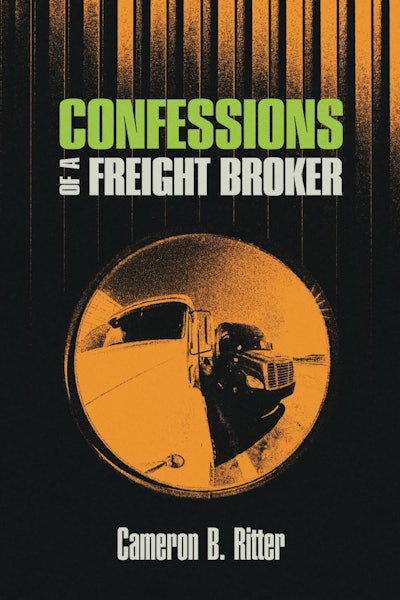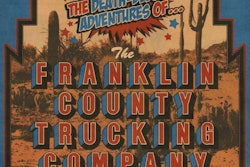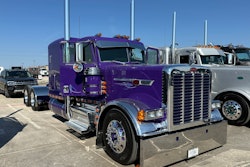 Author Cameron B. Ritter's new novel is out as of early November.
Author Cameron B. Ritter's new novel is out as of early November.
Ritter, a former freight broker himself once based in Austin, Texas, describes an office culture of Adderall-popping ne’er-do-wells, 9 a.m.-beer-guzzling frat boys and stoners who high-five each other whenever they sell a $5,500 load for $3,000 to some unsuspecting trucker of Eastern European birth they universally refer to as Vlad.
The story is told through the eyes of Ritter’s protagonist, Chris. As Chris explains, "Some of them have too many k’s and v’s and y’s to pronounce, so the guys just called them all Vlad.”
Chris details one such incident in the book:
Vlad was desperate as soon as he called in. Noah chatted him up a bit to find some tells; the poor bastard had been on the road for eleven days and had a barbecue to attend back in Hackensack. He’d just delivered a load in Los Angeles and had no clue where his next load was.
Jackpot!
Noah sifted through our board and found a load to sell him: Commerce, California, to Hackensack, New Jersey. ... Time was running out on Friday, so when Noah floated out his low-ball offer of $3,000 (which barely covered the cost of fuel, let alone insurance or maintenance), Vlad reluctantly accepted. "I take it," Vlad said. "Send contract."
And bang -- just like that, Noah had the load booked with $2,500 in margin for the company and $500 commission into his pocket.
There’s so much to unpack from this one account. Front of mind is to be careful of your own tells. If a broker asks where home is, he may, in some alternate universe, be taking a personal interest in you or he may just be probing for weakness. If you tell him you’ve just got to get back home to a family barbecue in New Jersey, and he doesn’t know you, you’ve probably just made yourself his lawful prey.
“I’m not sure who started lying first, brokers or truckers, but I was damn sure we brokers had no interest in setting things straight.”
--Cameron B. Ritter's protagonist in 'Confessions'
Second, if Ritter’s account of the underbelly of load board-brokerage culture is accurate, for every three dudes who blow your doors off doing 70 over Elk Mountain this winter while you’re barely holding it together in the snow and ice doing 40, there’s likely a stoner like Noah hitting a bong in an Austin jacuzzi, boasting to his buddies how he stuck it to a few more Vlads.
For me, Ritter’s fictional account suggests any link between low compensation and compliance will never be remedied, despite the feds’ attempts at locking down some of those compliance areas with GPS monitoring, ELDs and the like. Therefore, the culture that produces the Noahs of this world, according to the FMCSA's transparency proposal, is in dire need of structural alteration.
The "Confessions" book was so thought-provoking and, at points, outright triggering that I asked my old broker friend, Brian Hardman of Fulmer Logistics, what he thought about FMCSA's transparency proposal in light of the seedy culture described in Ritter’s book. Hardman sounded like a lot of other brokers when he contended that, “in the end, it will hurt rates in these already troubled times. If I’ve got a load of Tropicana going to Atlanta [from Fort Pierce, Florida] that pays $1,200 and I’m paying you $1,050, once the whole world knows that the load pays $1,200, come contract time someone will come in at $1,175.”
While FMCSA's transparency proposal, of course, doesn't guarantee the rates in that example would become truly public knowledge, it's also true the staid trucking universe that was available to older guys like me with years-long associations with reputable brokers like Hardman, and plenty others with direct freight contracts with established shippers, is largely out of reach to those newly arrived to the business -- not to mention to U.S. shores themselves. So many just get their freight on their devices from digital boards of this or that variety, which Cameron Ritter's narrator compares to Tinder swiping, a dystopian hellscape where the most inexperienced operators are being managed and exploited by the least principled actors in the industry.
The Noahs of this world are not your father’s freight brokers.
 "Confessions of a Freight Broker" author Cameron B. Ritter
"Confessions of a Freight Broker" author Cameron B. Ritter
[Related: Brian Hardman, broker of Fulmer Logistics: 'Load boards are a gamble, for me and for carriers']
To Hardman's point, in the book there's an account of a load disappearing for weeks that was supposed to arrive within three days. “It happens," Chris’s boss explains. Other nightmare scenarios rear their heads: tales of fraudsters putting loads on trains to get them hauled across the country dirt cheap and still expecting to be paid when the load is three weeks late, for instance.
Meanwhile, the truckers of Ritter’s narrative, who neither know their costs nor their worth, are too desperate to hold the line.
Some have a plan to overcome the rates, though. Enter what narrator Chris describes as the “Strong Single Sergy,” that 1,000-mile-a-day supertrucker from, you guessed it, Eastern Europe. He'll declare himself a team if necessary to get the miles he wants.
I can personally verify the practice is not new nor relegated to guys originally from Eastern Europe. I once had a boss that booked me as a team. My go-to co-driver was an imaginary friend named Clayton. That was a couple decades ago. So, yeah, I used to be one of those guys. The brokers had a different description for us then. They called us hillbilly produce haulers.
The toxic symbiosis such a trucker forms with guys like Noah is an American story as old as that of the Triangle Shirtwaist Factory and the factory owners' exploitation of workers, in that case many of them recent immigrants. (A fire broke out at the factory, killing many women and girls working there in part because they could not escape -- doors to the outside were locked to prevent unauthorized breaks.)
Yet is the Noah of the story in "Confessions" actually breaking any rules? "Is it the government's job to save business owners from our own stupidity?" I asked an independent trucker friend, Marcus Sommers.
For Sommers, the responsibility of negotiating falls squarely on the motor carrier. “In order to haul a load, two parties have to sign a contract," he said. "Nobody’s holding a gun to anyone’s head here. I’ve altered contracts sent to me to include accessorial charges like [Truck Ordered Not Used fees] and detention if they weren’t in there. I tell them, 'I can’t dispatch my truck until you sign off on that.' You’re either running your business or someone else is.”
Protagonist Chris, a buttoned-down college grad, only survives the high attrition of his corner of load board-brokerage culture by lowering his standards. The chronicle of his decline is an all-too-familiar story in trucking. Toward the end of the book, he conveniently neglects to mention that a load is hazmat to yet another Eastern European-born operator. When an angry message arrives demanding an extra $500 for hauling a hazmat load, he just ignores it.
[Related: POLL: Your view of FMCSA's broker-transparency proposal and potential impact?]
The timing of “Confessions of a Freight Broker” could not be any more serendipitous. The FMCSA’s proposal would oblige brokers to provide carriers with detailed transaction records in digital format, precluding the carrier from having to conduct audits of hard copy records at the broker’s office (which, according to most accounts, almost never happens). Ritter's work of fiction, to the extent it gets to a truth about today's trucking world, makes for a compelling example as to why making an extant regulation actionable through updated technology, and tweaks in regulatory language, might be a worthy cause.
In a world where everything we do is digitized, scrutinized, recorded on a camera and curated, maybe it’s time to have a conversation about how many of the billions of dollars this industry generates are going to the people who are doing the actual delivering of freight. At the very least, to my mind, Ritter's book serves as a chilling look at how recent arrivals to U.S. trucking are jerked around for profit. I’m just an old trucker who types with one finger on a tablet, but it feels to me that current practice stands for marked improvement.
But Sommers feels more regulation isn't going to help. “We need smarter motor carriers," he said, "not more government interference. Half these guys don’t even know their costs. I’ve had good relationships with C.H. Robinson. The more work I did for them, the better loads I got. Some of your readers may not like this, but I’ve had nothing but positive interactions with TQL. You have to negotiate."
I had a chance to ask Cameron Ritter how he came to write the book. Here's what he said: “I took what I heard on the phones, read about online, and experienced with my own two eyes and combined it all into a story that I thought would resonate with the masses.”
It definitely resonated with me.
Cameron B. Ritter can be found on Substack via this link.
Long Haul Paul is a four-million-mile trucker, writer and singer-songwriter. He can be reached at [email protected].










